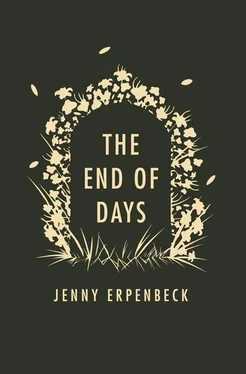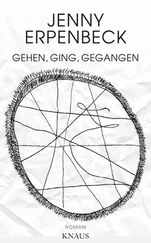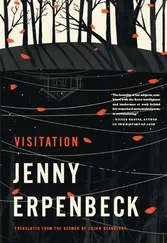Jenny Erpenbeck - The End of Days
Здесь есть возможность читать онлайн «Jenny Erpenbeck - The End of Days» весь текст электронной книги совершенно бесплатно (целиком полную версию без сокращений). В некоторых случаях можно слушать аудио, скачать через торрент в формате fb2 и присутствует краткое содержание. Год выпуска: 2014, Издательство: New Directions Publishing, Жанр: Современная проза, на английском языке. Описание произведения, (предисловие) а так же отзывы посетителей доступны на портале библиотеки ЛибКат.
- Название:The End of Days
- Автор:
- Издательство:New Directions Publishing
- Жанр:
- Год:2014
- ISBN:нет данных
- Рейтинг книги:4 / 5. Голосов: 1
-
Избранное:Добавить в избранное
- Отзывы:
-
Ваша оценка:
- 80
- 1
- 2
- 3
- 4
- 5
The End of Days: краткое содержание, описание и аннотация
Предлагаем к чтению аннотацию, описание, краткое содержание или предисловие (зависит от того, что написал сам автор книги «The End of Days»). Если вы не нашли необходимую информацию о книге — напишите в комментариях, мы постараемся отыскать её.
The End of Days — читать онлайн бесплатно полную книгу (весь текст) целиком
Ниже представлен текст книги, разбитый по страницам. Система сохранения места последней прочитанной страницы, позволяет с удобством читать онлайн бесплатно книгу «The End of Days», без необходимости каждый раз заново искать на чём Вы остановились. Поставьте закладку, и сможете в любой момент перейти на страницу, на которой закончили чтение.
Интервал:
Закладка:
It snowed that last night, there was even sleet. Thin sheets of ice were floating around on the lake, but they broke apart as soon as the prow of our boat touched them.
A handful of comrades thought he had a gift.
That evening he read us his latest story in parting.
Gifted — that can mean all sorts of things.
The next day we went our separate ways.
We cannot continue to employ the designation “gifted” if he is being expelled from the organization as a writer of trash.
Hurriedly, and in fine spirits, our friend strolled off. One week later he left for Moscow.
Only a single person said he agreed with me, in a whisper: it was him. Dear comrade, I said, if you share this opinion, do stand up and say so aloud. He said that he would, but soon after he disappeared.
He stopped just the one time, to turn around and wave to us.
Shocking what he tried to pull.
I shall always see his face before me.
Tried to incite me to.
His solid, almost stocky figure.
To say that the book is garbage.
His closely shorn, stubbly hair.
Unmasked in his dream of being a writer, just in time.
Those watchful eyes.
Banished from literature.
. that were now filled with joyful expectation.
The case involving the existence of a group in Moscow with an absolute idiot at its head — the individual in question — has now been rectified.
3
A good friend of her husband’s, the theater director N., had given her and her husband a letter of introduction to Yagoda, the head of the secret service, when they emigrated to the Soviet Union. Her husband didn’t want to use it, why not, she said, he said: cronyism isn’t Socialism, and he flipped the strand of hair out of his face, she said, that isn’t cronyism, it’s just one comrade lending another a helping hand. If we do our work well, we won’t need any help, her husband said, then he tore up the letter and threw it in the wastepaper basket. Meanwhile Yagoda has been relieved of his duties, arrested, and — recently, during the third show trial — indicted, then condemned to death and executed. Perhaps Yagoda’s successors are coming up the stairs this very moment. Did her husband really tear up the letter of introduction, or did she — as she sometimes imagined, dreamed, or perhaps even really remembered during the nights following his arrest — retrieve the scraps of paper from the wastebasket, glue them together, and put the document back in the drawer? Then it would be found now and would provide a justification for her arrest. She absolutely must finish the account of her life before she is arrested. Then this piece of writing can do battle with that letter, assuming someone really has found it, or will find it and wish to use it as evidence against her and her husband: paper against paper.
*
With the roller to the side of her typewriter, she scrolls back up the last eight lines, then strikes the “X” key over and over until the paragraph she has just written becomes illegible. Then she goes on writing.
Active in.
While fighting.
Journey to.
At work on.
He, he, and she.
Hitler’s victory in the election most certainly spelled defeat for the German working classes, but at the time could one really describe it as a defeat for the Communist Party of Germany, as her husband had done?
Sch., the man in the yellow suit jacket — now a delegate to the Communist International — had replied to her husband: If the Social Democrats hadn’t drawn a line between themselves and the Communists, but instead had joined with the Communists to create a united front against the Nazis, there wouldn’t have been a majority for Hitler.
We didn’t lose the workers to social democracy, we lost them to the Fascists, her husband had said, and then asked: Why? Because of this question — which he had ultimately been asking himself, not the delegate to the Communist International — he had been severely chastised by the Party, and demoted to performing lower-level Party work.
Her husband had spent one year in Berlin without papers collecting membership dues from a group of five Party members.
Shortly after her husband had left for Germany, she went for a walk on frozen Lake Neusiedl with her friend G. and asked him whether they ought to wish that Marx had been wrong, in other words that when capitalism went to seed, it wasn’t because the petit bourgeois had slid down into the proletariat, but because the proletariat had slid upwards into the petite bourgeoisie and in their new capacity as petit bourgeois had voted for Hitler.
But what about the working classes?
Marx was not mistaken, her friend G. said. The working classes had voted for Hitler, but H. was still wrong in his theory that the Communist Party had been defeated.
But Hitler is leading the workers into the next war to defend the interests of Big Capital, leading them to the slaughter! Haven’t people always said: A vote for Hitler is a vote for war?
The worse this war turns out to be, G. said, the better for us. For the masses to turn away from him and come running into our arms, we need the crimes he is about to commit to be as huge as possible.
She looked down to contemplate this sentence, looked at the thin layer of snow lying upon the ice, and thought about how shallow the water in this lake was. The lake was enormous, but when you swam in it during the summer, there was no point where the water reached higher than your neck.
She didn’t see her husband again until 1934, in Prague, and from there the two of them applied for a visa to the Soviet Union. Shortly after their arrival in Moscow, they heard Dimitrov speak at the Seventh World Congress of the Communist International. In his speech he said the same thing as her husband two years before: If the Social Democrats hadn’t drawn a line between themselves and the Communists, but instead had joined with the Communists to create a united front against the Nazis, there wouldn’t have been a majority for Hitler.
But what was right could only be right when it was uttered and codified by the Party, that’s what the Party was there for: to be the wisdom of many, not the wisdom of one. An individual might lose his head, but not an entire Party.
*
Instead of taking on Hitler jointly, Communists and Social Democrats jointly erred; on the basis of two carefully differentiated, but equally faulty, assessments of the situation, they apparently arrived at two carefully differentiated but equally faulty positions. The Social Democrats described the Communists as radicalinskis , as terrorists and subversives, while the Communists decried the Social Democrats as the murderers of the workers, the slaves of Big Capital and Social Fascists . Once labels of this sort were applied, an alliance was no longer possible. But did all these words matter?
In the two years that passed between one sentence and the next, her friend G. was arrested while performing illegal work in Germany and shot at Brandenburg Prison, and her lovely friend Z. was behind bars. She’d heard that poet J. — cat hair on his jacket, his teeth brown from smoking — had gone underground, but she never heard from him again.
Certainly all decisions about whom one should form alliances with — when and at what cost — had to be reevaluated moment by moment. Before you set out to fight the enemy, you had to know who the enemy was. But who could know for sure?
G. had long since been buried in Brandenburg soil, his two eyes shut forever — the Nazis had condemned and executed him on charges of high treason. If he were still alive, they would no doubt be charging him with high treason here in Moscow as well, since to the end he maintained a close friendship with A., the latter-day Trotskyite. Given that Hitler seemed not to be going anywhere and the formation of factions was proving to be part of the general collapse, this friendship (which at the time was not yet a crime but only something difficult to understand: an error perhaps, a case of thickheadedness, shortsighted obstinacy, but also perhaps, who knows, the result of meticulous tactical deliberations on the part of the intellectual pioneer of the Communist movement G.) would most certainly have metamorphosed into an unpardonable wrong. But by executing G. for treason in 1934 at Brandenburg Prison, the Fascists had ensured that what would remain in his comrades’ memory was his fame. Death is the beginning of immortality. Meanwhile, the doors to the hall of fame have been sealed up, and the Beyond is nothing more than an endless strip of sand between the fronts, a no-man’s-land in which all those who have gone missing over the last few months — now including her husband — will be forced, dead or alive, to walk on and on unto all eternity on their bloody feet.
Читать дальшеИнтервал:
Закладка:
Похожие книги на «The End of Days»
Представляем Вашему вниманию похожие книги на «The End of Days» списком для выбора. Мы отобрали схожую по названию и смыслу литературу в надежде предоставить читателям больше вариантов отыскать новые, интересные, ещё непрочитанные произведения.
Обсуждение, отзывы о книге «The End of Days» и просто собственные мнения читателей. Оставьте ваши комментарии, напишите, что Вы думаете о произведении, его смысле или главных героях. Укажите что конкретно понравилось, а что нет, и почему Вы так считаете.












